The World of the English Language For the






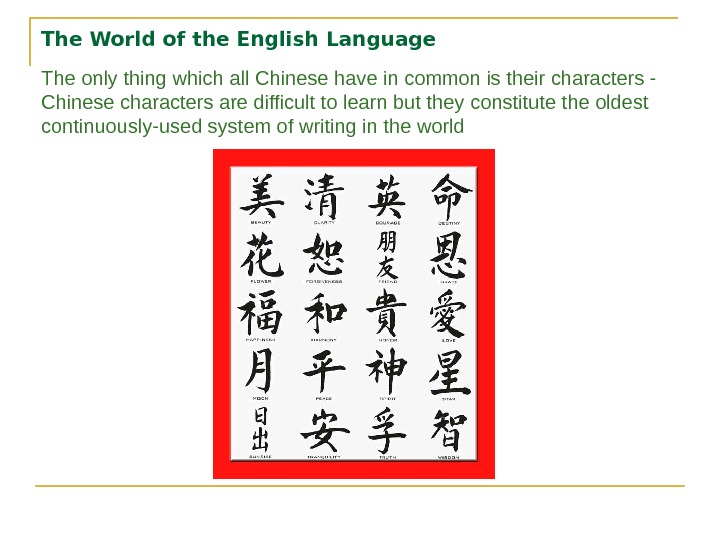


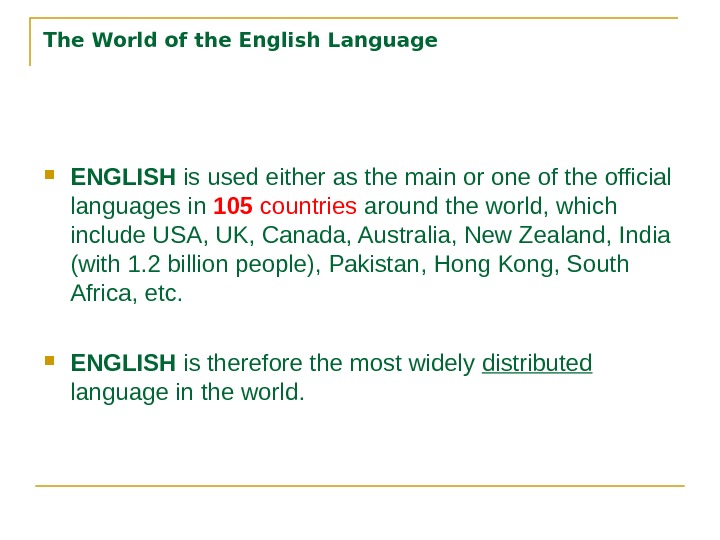






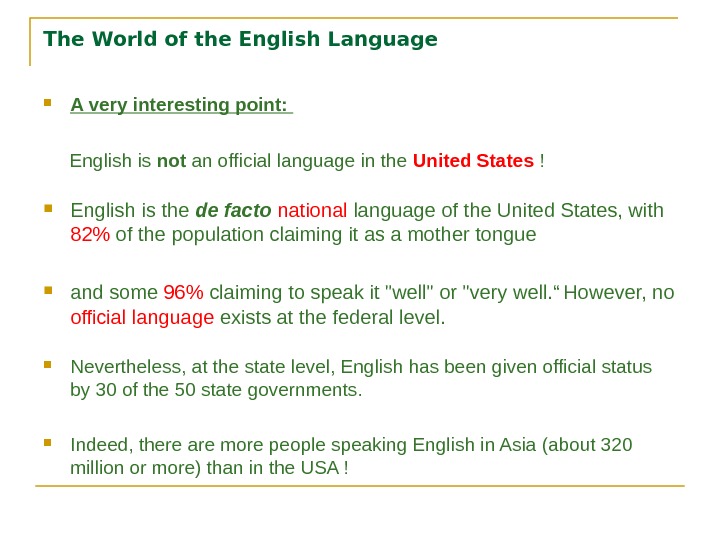
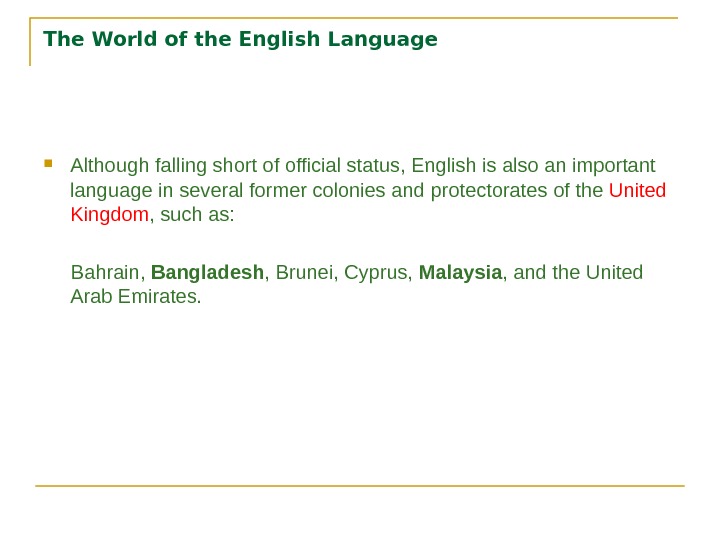
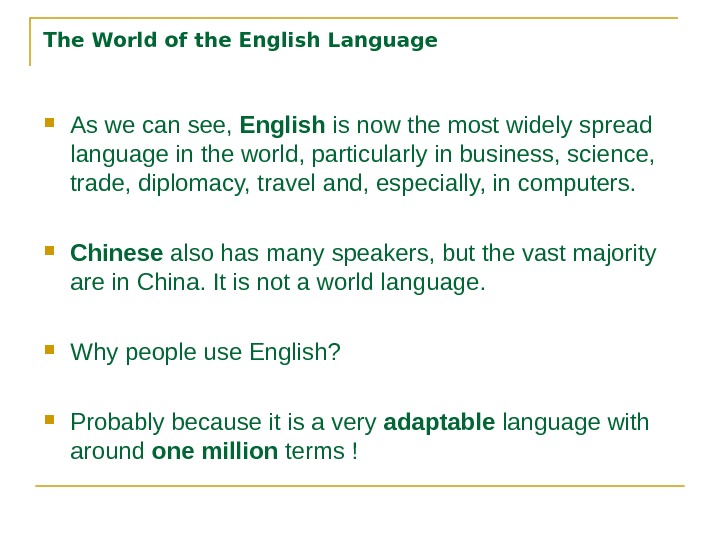


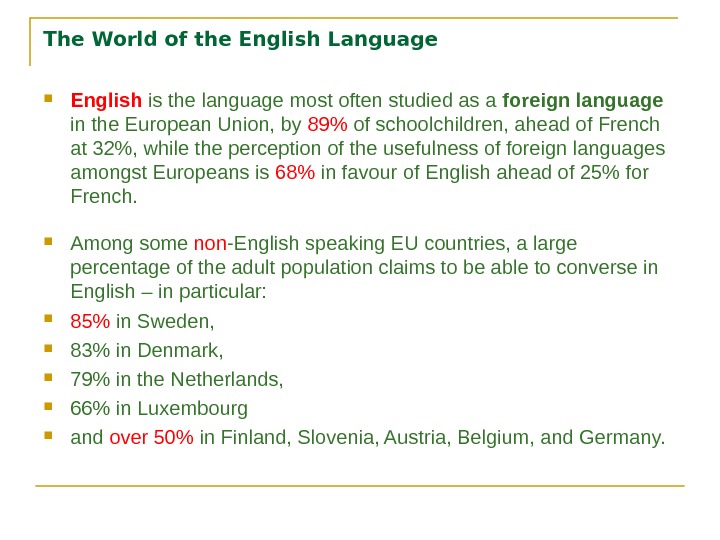

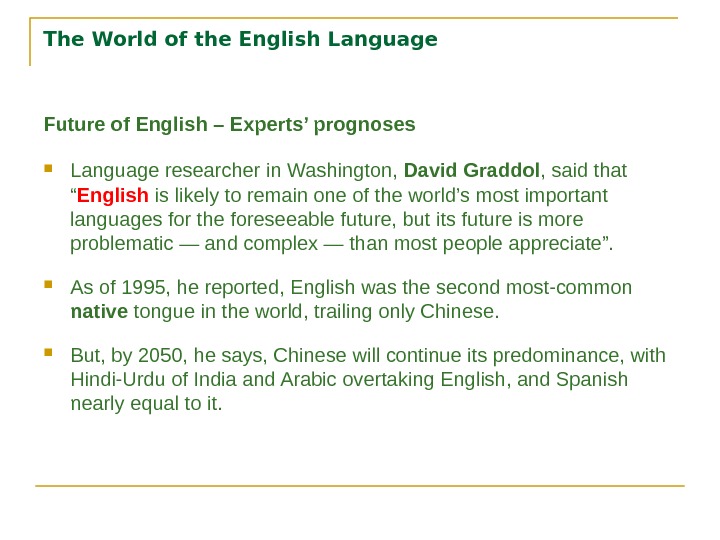
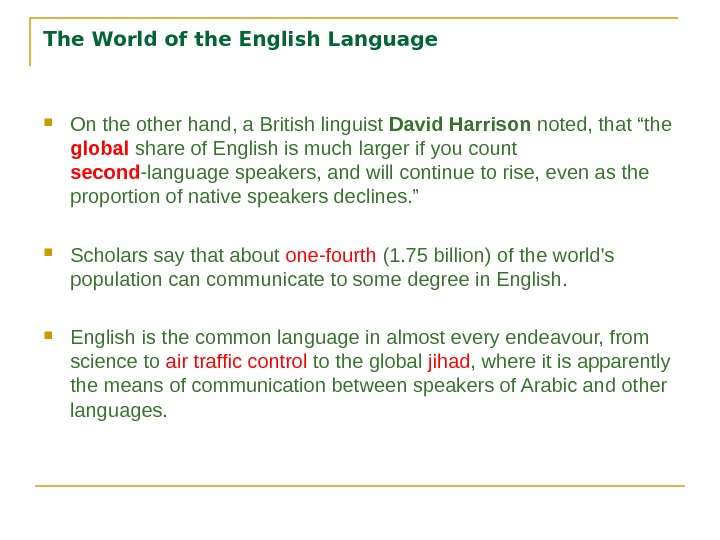



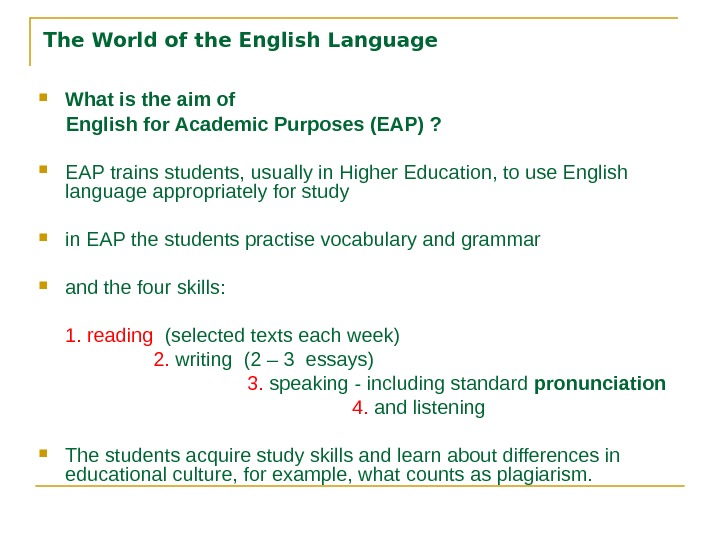






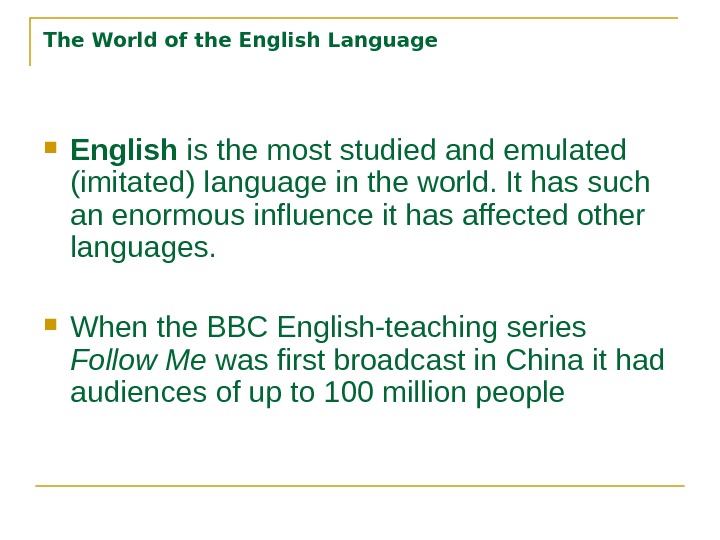

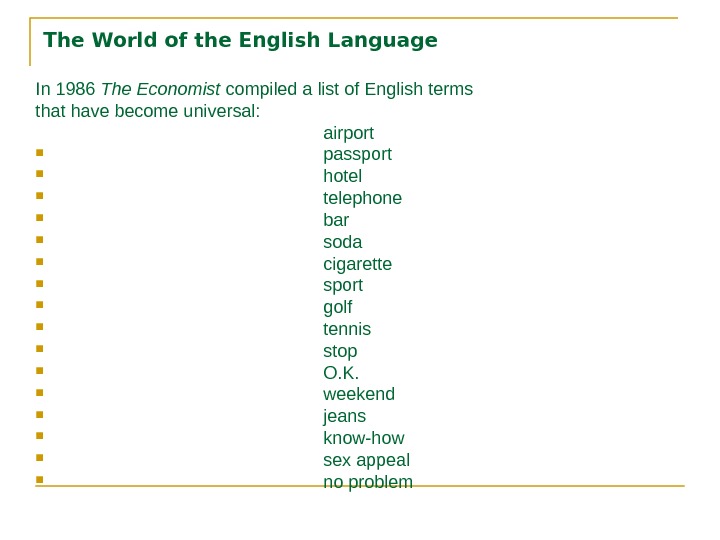


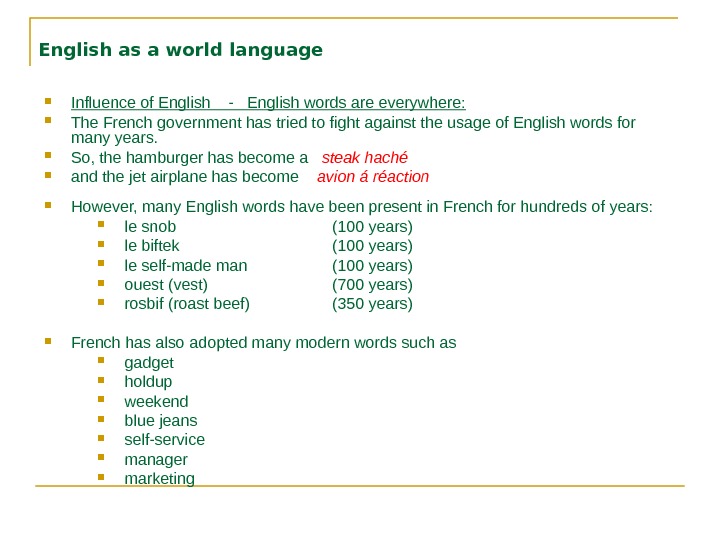







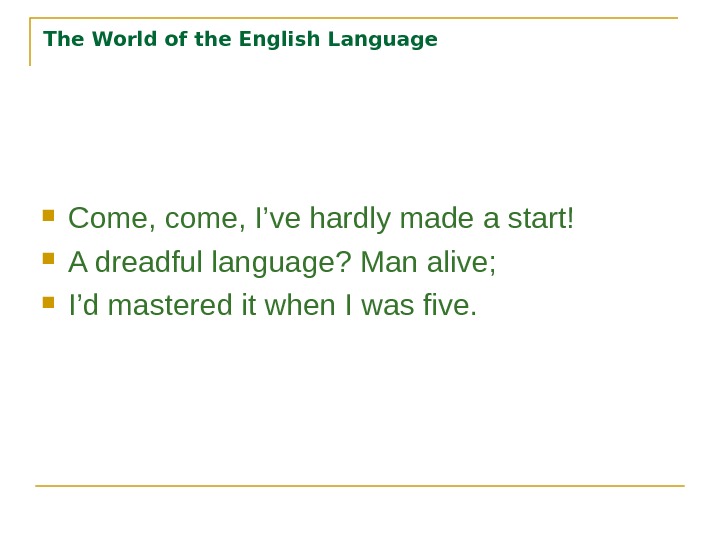
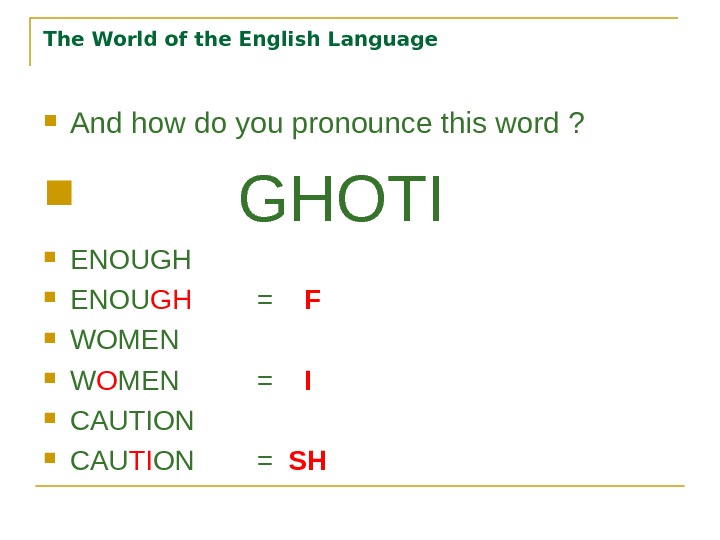



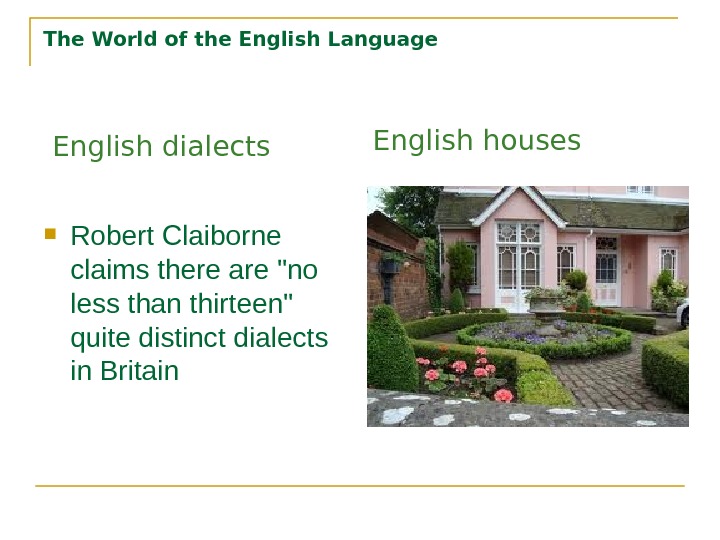









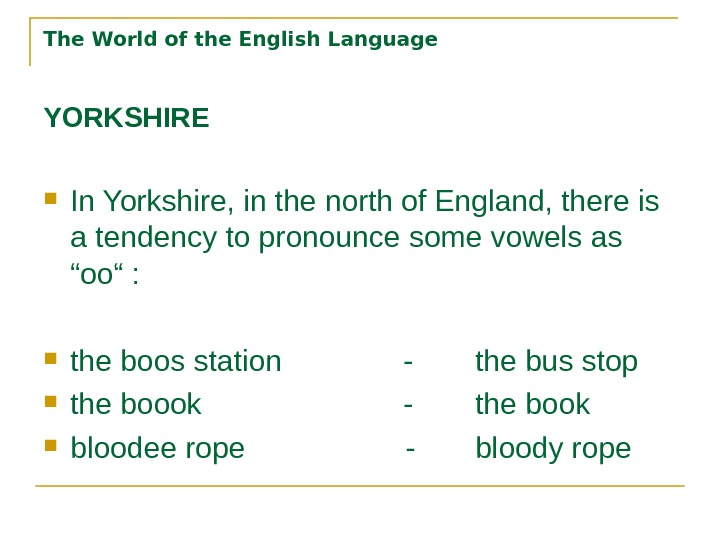

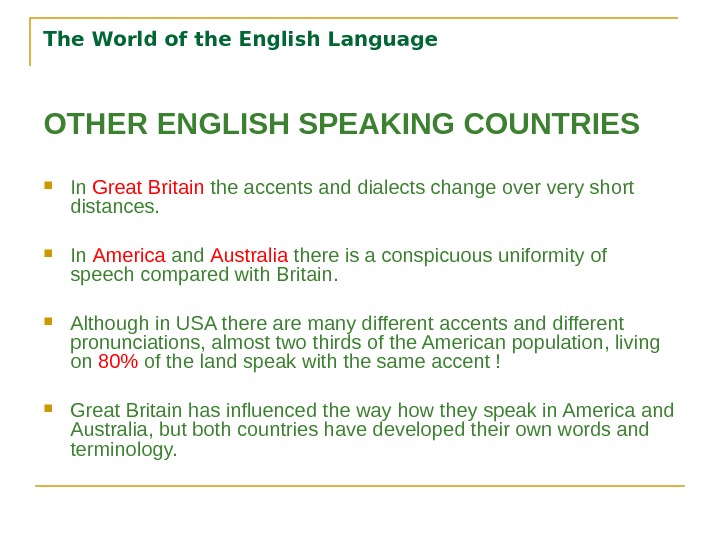






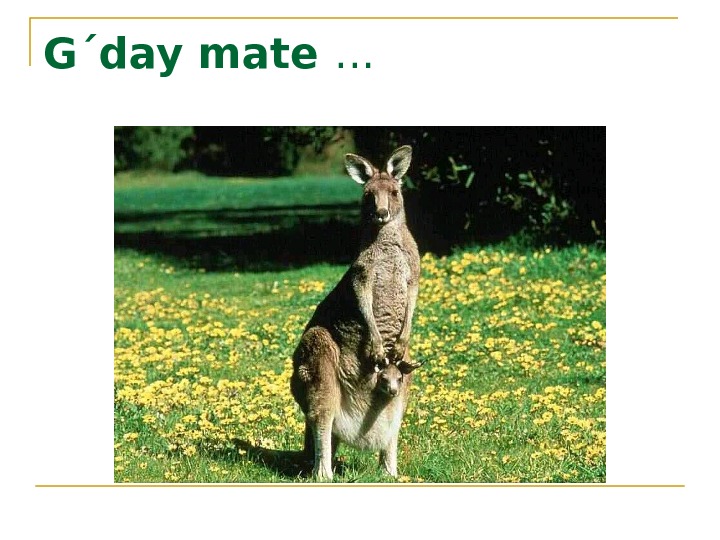
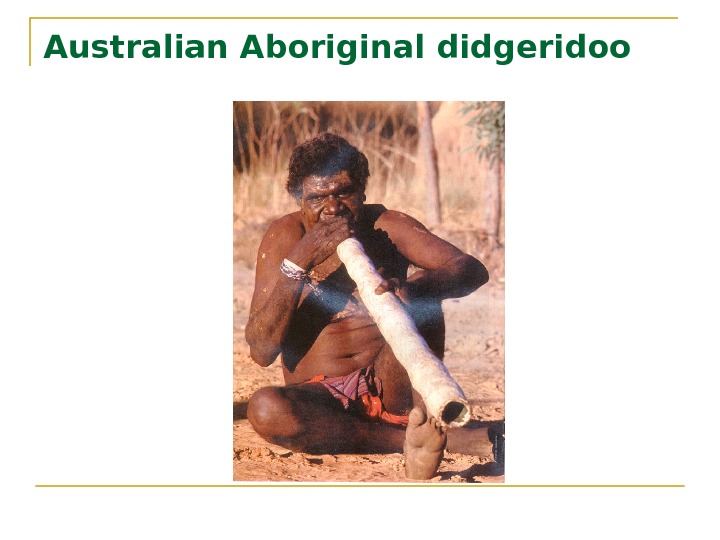




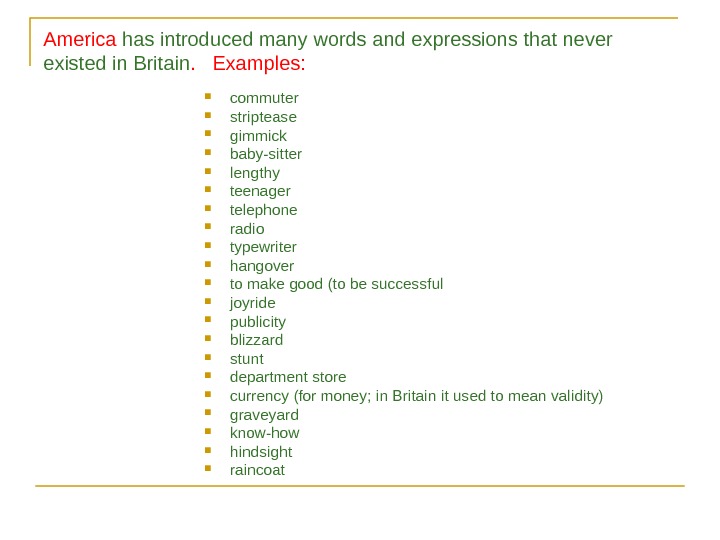
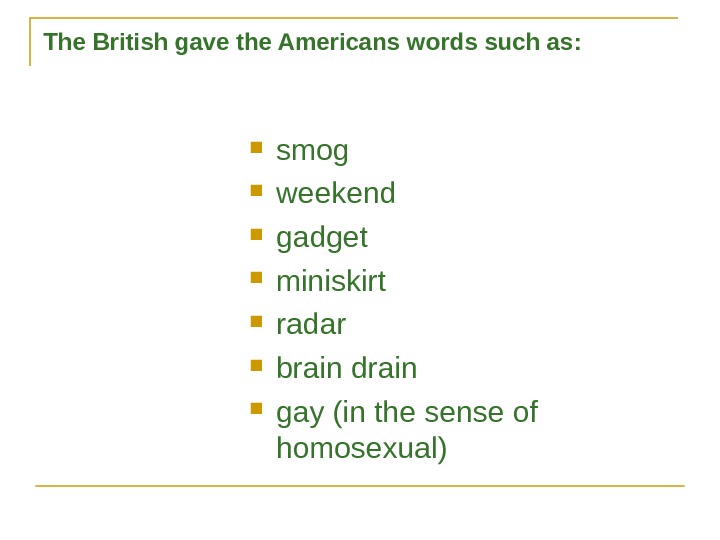
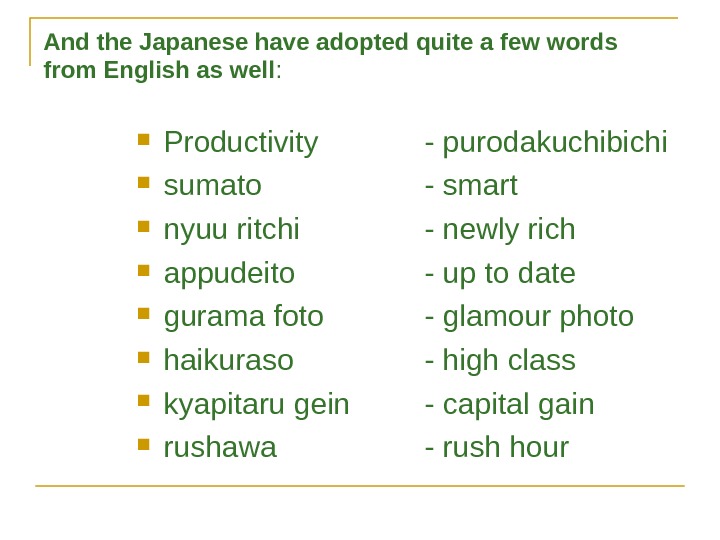
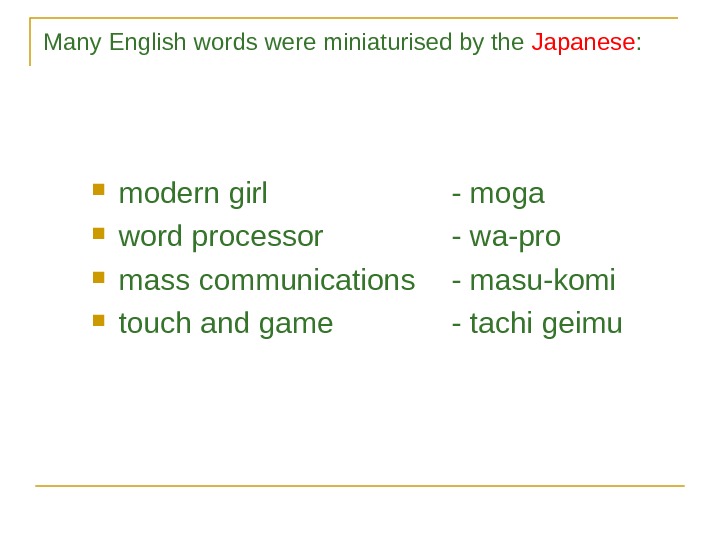






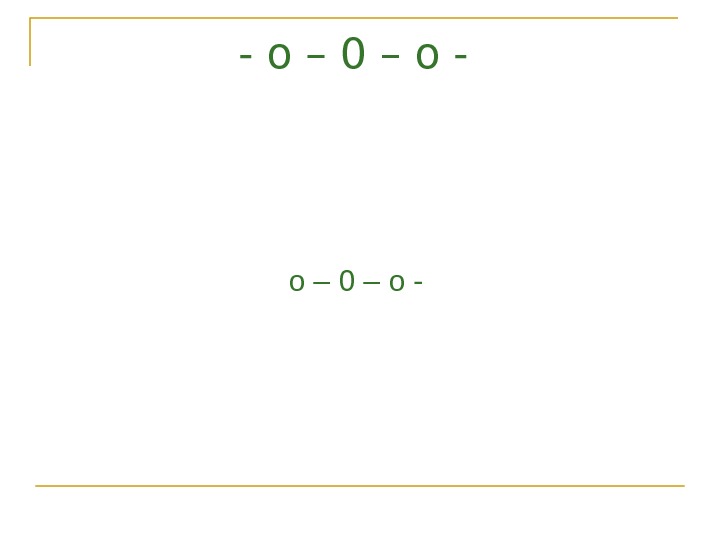

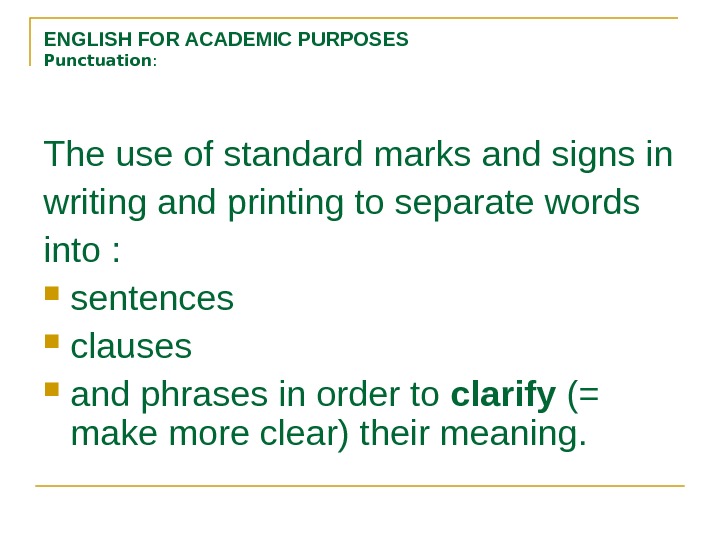
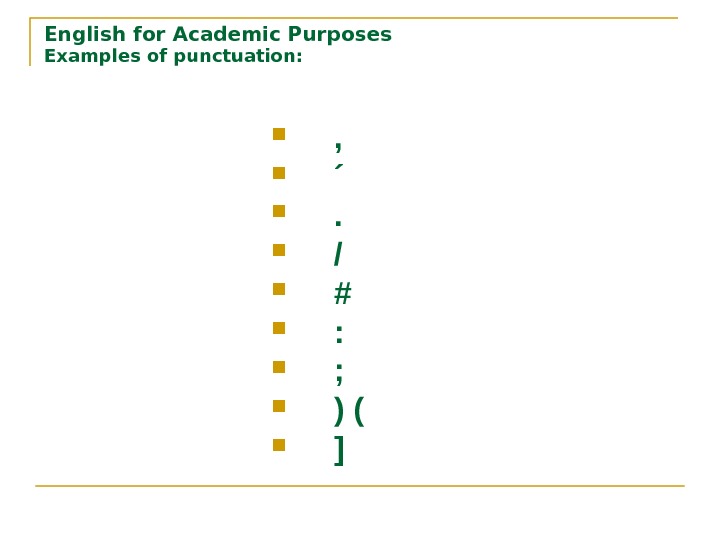

eap_lecture_1_the_world_of_english_sep_2014.ppt
- Размер: 6.8 Mегабайта
- Количество слайдов: 92
Описание презентации The World of the English Language For the по слайдам
 The World of the English Language For the B Sc , Degree and Erasmus Students Ing. Alan Westcott History, background, importance and future of English
The World of the English Language For the B Sc , Degree and Erasmus Students Ing. Alan Westcott History, background, importance and future of English
 QUESTION: Which language is spoken by the highest number of people in the world ? The World of the English Language
QUESTION: Which language is spoken by the highest number of people in the world ? The World of the English Language
 The World of the English Language ANSWER ? It depends what sources of information you use. Many countries do not have accurate population numbers or data on the languages the different sections of the populations speak. And many countries try to emphasise the importance of their own language.
The World of the English Language ANSWER ? It depends what sources of information you use. Many countries do not have accurate population numbers or data on the languages the different sections of the populations speak. And many countries try to emphasise the importance of their own language.
 The World of the English Language So, what is the answer ? Chinese ?
The World of the English Language So, what is the answer ? Chinese ?
 The World of English Language Strictly speaking, there is no such language as Chinese, just like there is no Czechoslovakian , Belgian or Swiss language. In China they have many languages (called dialects by the Chinese). The only thing they all have in common is the Chinese characters. The most commonly spoken dialects are Chinese Mandarin and then Cantonese.
The World of English Language Strictly speaking, there is no such language as Chinese, just like there is no Czechoslovakian , Belgian or Swiss language. In China they have many languages (called dialects by the Chinese). The only thing they all have in common is the Chinese characters. The most commonly spoken dialects are Chinese Mandarin and then Cantonese.
 The World of the English Language The only thing which all Chinese have in common is their characters — Chinese characters are difficult to learn but they constitute the oldest continuously-used system of writing in the world
The World of the English Language The only thing which all Chinese have in common is their characters — Chinese characters are difficult to learn but they constitute the oldest continuously-used system of writing in the world
 The World of the English Language Mandarin Chinese is spoken by about 750 million to 1 billion people (depending on the source of your information), more than any other language in the world ( not all Chinese in the population of 1. 4 billion can speak Mandarin) But try to see how far “Chinese“ gets you in Rome, Madrid, Prague or Stockholm, or even Buenos Aires or Johanesburg on the other side of the globe.
The World of the English Language Mandarin Chinese is spoken by about 750 million to 1 billion people (depending on the source of your information), more than any other language in the world ( not all Chinese in the population of 1. 4 billion can speak Mandarin) But try to see how far “Chinese“ gets you in Rome, Madrid, Prague or Stockholm, or even Buenos Aires or Johanesburg on the other side of the globe.
 The World of the English Language So, how many people around the world speak English?
The World of the English Language So, how many people around the world speak English?
 The World of the English Language ENGLISH is used either as the main or one of the official languages in 105 countries around the world, which include USA, UK, Canada, Australia, New Zealand, India (with 1. 2 billion people), Pakistan, Hong Kong, South Africa, etc. ENGLISH is therefore the most widely distributed language in the world.
The World of the English Language ENGLISH is used either as the main or one of the official languages in 105 countries around the world, which include USA, UK, Canada, Australia, New Zealand, India (with 1. 2 billion people), Pakistan, Hong Kong, South Africa, etc. ENGLISH is therefore the most widely distributed language in the world.
 The World of the English Language T he range of estimates of speakers of various languages by UNESCO and other organisations : English 1 billion * speakers Chinese Mandarin speakers 800 million to 1 billion Hindi (with Urdu) in India 500 million Spanish (remember: Brazil speaks Portuguese ) 450 million Russian 326 million Arabic 250 million French, German 125 million each * Some estimates go as high as 1. 4 billion people who speak English. Of those, half a billion people use English as their first language
The World of the English Language T he range of estimates of speakers of various languages by UNESCO and other organisations : English 1 billion * speakers Chinese Mandarin speakers 800 million to 1 billion Hindi (with Urdu) in India 500 million Spanish (remember: Brazil speaks Portuguese ) 450 million Russian 326 million Arabic 250 million French, German 125 million each * Some estimates go as high as 1. 4 billion people who speak English. Of those, half a billion people use English as their first language
 The World of the English Language Countries where English is spoken as a 1 st or official language
The World of the English Language Countries where English is spoken as a 1 st or official language
 The World of the English Language Populations of some of the larger countries where English is spoken as a 1 st or 2 nd (official) language: USA 313 million UK 63 million Canada 35 million (22 million English speakers) Australia 22 million ——————————————— India 1. 2 billion Pakistan 177 million Nigeria 167 million Philippines 94 million South Africa 50 million Kenya 41 million Malaysia 28 million Source: http: //en. wikipedia. org/wiki/English_language
The World of the English Language Populations of some of the larger countries where English is spoken as a 1 st or 2 nd (official) language: USA 313 million UK 63 million Canada 35 million (22 million English speakers) Australia 22 million ——————————————— India 1. 2 billion Pakistan 177 million Nigeria 167 million Philippines 94 million South Africa 50 million Kenya 41 million Malaysia 28 million Source: http: //en. wikipedia. org/wiki/English_language
 The World of the English Language Countries where English is a major language : English is the primary language in: Anguilla, Antigua and Barbuda, Australia , the Bahamas, Barbados, Belize, Bermuda, the British Ocean Territory, the British Virgin Islands, Canada , the Cayman Islands, Dominica, the Falkland Islands, Gibraltar, Grenada, Guam, Guernsey, Guyana, Ireland , the Isle of Man, Jamaica, Jersey, Montserrat, Nauru, New Zealand , Pitcairn Islands, Saint Helena, Ascension and Tristan de Cunha, Saint Kitts and Nevis, Saint Vincent and the Grenadines, Singapore, South Georgia and the South Sandwich Islands, the United Kingdom and the United States
The World of the English Language Countries where English is a major language : English is the primary language in: Anguilla, Antigua and Barbuda, Australia , the Bahamas, Barbados, Belize, Bermuda, the British Ocean Territory, the British Virgin Islands, Canada , the Cayman Islands, Dominica, the Falkland Islands, Gibraltar, Grenada, Guam, Guernsey, Guyana, Ireland , the Isle of Man, Jamaica, Jersey, Montserrat, Nauru, New Zealand , Pitcairn Islands, Saint Helena, Ascension and Tristan de Cunha, Saint Kitts and Nevis, Saint Vincent and the Grenadines, Singapore, South Georgia and the South Sandwich Islands, the United Kingdom and the United States
 The World of the English Language In some countries where English is not the most spoken language, it is an official language ; these countries include: Botswana, Cameroon, the Federated States of Micronesia, Fiji, Gambia, Ghana, India , Kenya , Kiribati, Lesotho, Liberia, Madagaskar, Malta, the Marshall Islands, Mauritius, Namibia, Nigeria , Pakistan , Palau, Papua New Guinea, the Philippines (Philippine English), Rwanda, Saint Lucia, Samoa, Seychelles, Sierra Leone, the Solomon Islands, Sri Lanka, Sudan, Souith Sudan, Swaziland, Tanzania, Uganda, Zambia, and Zimbabwe. Also there are countries where in a part of the territory English became a co-official language, e. g. Colombia’s San Andrés y Providencia and Nicaragua’s Mosquito Coast. This was a result of the influence of British colonisation in the area.
The World of the English Language In some countries where English is not the most spoken language, it is an official language ; these countries include: Botswana, Cameroon, the Federated States of Micronesia, Fiji, Gambia, Ghana, India , Kenya , Kiribati, Lesotho, Liberia, Madagaskar, Malta, the Marshall Islands, Mauritius, Namibia, Nigeria , Pakistan , Palau, Papua New Guinea, the Philippines (Philippine English), Rwanda, Saint Lucia, Samoa, Seychelles, Sierra Leone, the Solomon Islands, Sri Lanka, Sudan, Souith Sudan, Swaziland, Tanzania, Uganda, Zambia, and Zimbabwe. Also there are countries where in a part of the territory English became a co-official language, e. g. Colombia’s San Andrés y Providencia and Nicaragua’s Mosquito Coast. This was a result of the influence of British colonisation in the area.
 The World of the English Language More than one official language English is also one of the 11 official languages that are given equal status in South Africa ( South African English ). English is the official language in the current dependent territories of Australia ( Norfolk Island, Christmas Island Cocos Island ) and of the United States ( American Samoa , Guam, Northern Mariana Islands, Puerto Rico , and the US Virgin Islands. Also, the former British colony of Hong Kong.
The World of the English Language More than one official language English is also one of the 11 official languages that are given equal status in South Africa ( South African English ). English is the official language in the current dependent territories of Australia ( Norfolk Island, Christmas Island Cocos Island ) and of the United States ( American Samoa , Guam, Northern Mariana Islands, Puerto Rico , and the US Virgin Islands. Also, the former British colony of Hong Kong.
 The World of the English Language A very interesting point: English is not an official language in the United States ! English is the de facto national language of the United States, with 82% of the population claiming it as a mother tongue and some 96% claiming to speak it «well» or «very well. “ However, no official language exists at the federal level. Nevertheless, at the state level, English has been given official status by 30 of the 50 state governments. Indeed, there are more people speaking English in Asia (about 320 million or more) than in the USA !
The World of the English Language A very interesting point: English is not an official language in the United States ! English is the de facto national language of the United States, with 82% of the population claiming it as a mother tongue and some 96% claiming to speak it «well» or «very well. “ However, no official language exists at the federal level. Nevertheless, at the state level, English has been given official status by 30 of the 50 state governments. Indeed, there are more people speaking English in Asia (about 320 million or more) than in the USA !
 The World of the English Language Although falling short of official status, English is also an important language in several former colonies and protectorates of the United Kingdom , such as : Bahrain, Bangladesh , Brunei, Cyprus, Malaysia , and the United Arab Emirates.
The World of the English Language Although falling short of official status, English is also an important language in several former colonies and protectorates of the United Kingdom , such as : Bahrain, Bangladesh , Brunei, Cyprus, Malaysia , and the United Arab Emirates.
 The World of the English Language As we can see, English is now the most widely spread language in the world, particularly in business, science, trade, diplomacy, travel and, especially, in computers. Chinese also has many speakers, but the vast majority are in China. It is not a world language. Why people use English? Probably because it is a very adaptable language with around one million terms !
The World of the English Language As we can see, English is now the most widely spread language in the world, particularly in business, science, trade, diplomacy, travel and, especially, in computers. Chinese also has many speakers, but the vast majority are in China. It is not a world language. Why people use English? Probably because it is a very adaptable language with around one million terms !
 The World of the English Language By comparison with Chinese , English is the most global of languages and most important language in the world today: Two thirds of all scientific papers are published in English ( The Economist ) Nearly half of all business deals in Europe are conducted in English ( The Story of English ) M ore than 70% of the world’s mail is written and addressed in English
The World of the English Language By comparison with Chinese , English is the most global of languages and most important language in the world today: Two thirds of all scientific papers are published in English ( The Economist ) Nearly half of all business deals in Europe are conducted in English ( The Story of English ) M ore than 70% of the world’s mail is written and addressed in English
 The World of the English Language Because English is so widely spoken, it has often been referred to as a » world language «, the lingua franca of the modern era , and while it is not an official language in most countries, it is currently the language most often taught as a foreign language. Some linguists believe that it is no longer the exclusive cultural property of «native English speakers», but is rather a language that is absorbing aspects of cultures worldwide as it continues to grow. It is, by international treaty, the official language for aerial and maritime communications. English is an official language of the United Nations and many other international organisations, including the International Olympic Committee.
The World of the English Language Because English is so widely spoken, it has often been referred to as a » world language «, the lingua franca of the modern era , and while it is not an official language in most countries, it is currently the language most often taught as a foreign language. Some linguists believe that it is no longer the exclusive cultural property of «native English speakers», but is rather a language that is absorbing aspects of cultures worldwide as it continues to grow. It is, by international treaty, the official language for aerial and maritime communications. English is an official language of the United Nations and many other international organisations, including the International Olympic Committee.
 The World of the English Language English is the language most often studied as a foreign language in the European Union, by 89% of schoolchildren, ahead of French at 32%, while the perception of the usefulness of foreign languages amongst Europeans is 68% in favour of English ahead of 25% for French. Among some non -English speaking EU countries, a large percentage of the adult population claims to be able to converse in English – in particular: 85% in Sweden, 83% in Denmark, 79% in the Netherlands, 66% in Luxembourg and over 50% in Finland, Slovenia, Austria, Belgium, and Germany.
The World of the English Language English is the language most often studied as a foreign language in the European Union, by 89% of schoolchildren, ahead of French at 32%, while the perception of the usefulness of foreign languages amongst Europeans is 68% in favour of English ahead of 25% for French. Among some non -English speaking EU countries, a large percentage of the adult population claims to be able to converse in English – in particular: 85% in Sweden, 83% in Denmark, 79% in the Netherlands, 66% in Luxembourg and over 50% in Finland, Slovenia, Austria, Belgium, and Germany.
 The World of the English Language Books, magazines , and newspapers written in English are available in many countries around the world, and English is the most commonly used language in the sciences with Science Citation Index reporting as early as 1997 that 95% of its articles were written in English, even though only half of them came from authors in English-speaking countries.
The World of the English Language Books, magazines , and newspapers written in English are available in many countries around the world, and English is the most commonly used language in the sciences with Science Citation Index reporting as early as 1997 that 95% of its articles were written in English, even though only half of them came from authors in English-speaking countries.
 The World of the English Language Future of English – Experts’ prognoses Language researcher in Washington, David Graddol , said that “ English is likely to remain one of the world’s most important languages for the foreseeable future, but its future is more problematic — and complex — than most people appreciate”. As of 1995, he reported, English was the second most-common native tongue in the world, trailing only Chinese. But, by 2050, he says, Chinese will continue its predominance, with Hindi-Urdu of India and Arabic overtaking English, and Spanish nearly equal to it.
The World of the English Language Future of English – Experts’ prognoses Language researcher in Washington, David Graddol , said that “ English is likely to remain one of the world’s most important languages for the foreseeable future, but its future is more problematic — and complex — than most people appreciate”. As of 1995, he reported, English was the second most-common native tongue in the world, trailing only Chinese. But, by 2050, he says, Chinese will continue its predominance, with Hindi-Urdu of India and Arabic overtaking English, and Spanish nearly equal to it.
 The World of the English Language On the other hand, a British linguist David Harrison noted, that “the global share of English is much larger if you count second -language speakers, and will continue to rise, even as the proportion of native speakers declines. ” Scholars say that about one-fourth (1. 75 billion) of the world’s population can communicate to some degree in English is the common language in almost every endeavour, from science to air traffic control to the global jihad , where it is apparently the means of communication between speakers of Arabic and other languages.
The World of the English Language On the other hand, a British linguist David Harrison noted, that “the global share of English is much larger if you count second -language speakers, and will continue to rise, even as the proportion of native speakers declines. ” Scholars say that about one-fourth (1. 75 billion) of the world’s population can communicate to some degree in English is the common language in almost every endeavour, from science to air traffic control to the global jihad , where it is apparently the means of communication between speakers of Arabic and other languages.
 The World of the English Language There may be more native speakers of Chinese, Spanish or Hindi, but it is English they speak when they talk across cultures , and English they teach their children to help them become citizens of an increasingly intertwined world. At telephone call centres around the world, the key points of a globalized workplace, the language spoken is, naturally, English. On the radio , pop music carries the sounds of English to almost every corner of the earth. «English has become the second language of everybody , » said Mark Warschauer, a professor of education and informatics at the University of California, Irvine: «It’s gotten to the point where almost in any part of the world to be educated means to know English. «
The World of the English Language There may be more native speakers of Chinese, Spanish or Hindi, but it is English they speak when they talk across cultures , and English they teach their children to help them become citizens of an increasingly intertwined world. At telephone call centres around the world, the key points of a globalized workplace, the language spoken is, naturally, English. On the radio , pop music carries the sounds of English to almost every corner of the earth. «English has become the second language of everybody , » said Mark Warschauer, a professor of education and informatics at the University of California, Irvine: «It’s gotten to the point where almost in any part of the world to be educated means to know English. «
 The World of the English Language There are many ways of studying English. After learning basic English at school we can attend advanced courses such as: English for Specific Purposes (ESP), which is a specialised area of teaching English language. It includes many types, such as: 1. Academic English 2. Business English 2. Technical English 3. Scientific English 4. Legal English 5. English for medical professionals 6. Aviation English (ESP taught to pilots and air traffic controllers and radio communicators) 7. Diplomatic English There also specialised classes of English for tourism, sport, waiters, and many other areas of professional activities.
The World of the English Language There are many ways of studying English. After learning basic English at school we can attend advanced courses such as: English for Specific Purposes (ESP), which is a specialised area of teaching English language. It includes many types, such as: 1. Academic English 2. Business English 2. Technical English 3. Scientific English 4. Legal English 5. English for medical professionals 6. Aviation English (ESP taught to pilots and air traffic controllers and radio communicators) 7. Diplomatic English There also specialised classes of English for tourism, sport, waiters, and many other areas of professional activities.
 The World of the English Language ESP is taught in many universities of the world. Many professional associations of teachers of English (TESOL, IATEFL) have ESP sections. Much attention is devoted to ESP course design ESP teaching has much in common with English as a Foreign or Second Language and English for Academic Purposes (EAP). Quickly developing Business English can be considered as part of a larger concept of English for Specific Purposes.
The World of the English Language ESP is taught in many universities of the world. Many professional associations of teachers of English (TESOL, IATEFL) have ESP sections. Much attention is devoted to ESP course design ESP teaching has much in common with English as a Foreign or Second Language and English for Academic Purposes (EAP). Quickly developing Business English can be considered as part of a larger concept of English for Specific Purposes.
 The World of the English Language What is the aim of English for Academic Purposes (EAP) ? EAP trains students, usually in Higher Education, to use English language appropriately for study in EAP the students practise vocabulary and grammar and the four skills: 1. reading (selected texts each week) 2. writing (2 – 3 essays) 3. speaking — including standard pronunciation 4. and listening The students acquire study skills and learn about differences in educational culture, for example, what counts as plagiarism.
The World of the English Language What is the aim of English for Academic Purposes (EAP) ? EAP trains students, usually in Higher Education, to use English language appropriately for study in EAP the students practise vocabulary and grammar and the four skills: 1. reading (selected texts each week) 2. writing (2 – 3 essays) 3. speaking — including standard pronunciation 4. and listening The students acquire study skills and learn about differences in educational culture, for example, what counts as plagiarism.
 The World of the English Language At this university we use British English because we are part of and live in Europe in Cambridge tests – must choose either GB or US English – if you mix the two = failed exam We should not worry about our accents , but should be proud of our nationalities But we should worry about our pronunciation – because we want other people to understand what we are saying And we also want to be able to understand what other people are saying
The World of the English Language At this university we use British English because we are part of and live in Europe in Cambridge tests – must choose either GB or US English – if you mix the two = failed exam We should not worry about our accents , but should be proud of our nationalities But we should worry about our pronunciation – because we want other people to understand what we are saying And we also want to be able to understand what other people are saying
 The World of the English Language HISTORY OF ENGLISH English is a Germanic language which belongs to the Indo-European Family of languages. English has originated form Old Norse and Saxon. The closest languages to English are those in the Germanic Branch: German Dutch then: Swedish — has tones, which is unusual in European languages Norwegian Danish Icelandic — is the least changed of the Germanic languages, it is close to Old Norse
The World of the English Language HISTORY OF ENGLISH English is a Germanic language which belongs to the Indo-European Family of languages. English has originated form Old Norse and Saxon. The closest languages to English are those in the Germanic Branch: German Dutch then: Swedish — has tones, which is unusual in European languages Norwegian Danish Icelandic — is the least changed of the Germanic languages, it is close to Old Norse
 The World of the English Language Other related Germanic languages are: Flemish and Afrikaans = varieties of Dutch Yiddish = variety of German (which is written using Hebrew script) ——————————————— German has a system of four cases and three genders for its nouns. Case is the property where a noun takes a different ending depending on its role in a sentence. An example in English: lady, lady’s, ladies and ladies’. The genders in German are masculine , feminine and neuter. English has lost gender and case. Only a few words form their plurals like German (ox, oxen and child, children). Most words in English now add an «s», having been influenced by Norman French
The World of the English Language Other related Germanic languages are: Flemish and Afrikaans = varieties of Dutch Yiddish = variety of German (which is written using Hebrew script) ——————————————— German has a system of four cases and three genders for its nouns. Case is the property where a noun takes a different ending depending on its role in a sentence. An example in English: lady, lady’s, ladies and ladies’. The genders in German are masculine , feminine and neuter. English has lost gender and case. Only a few words form their plurals like German (ox, oxen and child, children). Most words in English now add an «s», having been influenced by Norman French
 The World of the English Language WHY WE PREFER ENGLISH English is concise (brief) and flexible. Compare English with examples of other languages: German: Wirtschaftstreuhandgessellschaft (a business trust company) Bundesbahnangestelltenwitwe (a widow of a federal railway employee), and Kriegsgefangenanentschädigungsgesetz (a law pertaining to war reparations)
The World of the English Language WHY WE PREFER ENGLISH English is concise (brief) and flexible. Compare English with examples of other languages: German: Wirtschaftstreuhandgessellschaft (a business trust company) Bundesbahnangestelltenwitwe (a widow of a federal railway employee), and Kriegsgefangenanentschädigungsgesetz (a law pertaining to war reparations)
 The World of the English Language While in Holland companies commonly have names of forty letters or more, such as: Dowe Egberts Koninklijke Tabaksfabriek-Koffiebranderijn-Theehandal Naamloze Vennootschap ( literally: Dowe Egberts Royal Tobacco Factory-Coffee Roasters-Tea Traders incorporated).
The World of the English Language While in Holland companies commonly have names of forty letters or more, such as: Dowe Egberts Koninklijke Tabaksfabriek-Koffiebranderijn-Theehandal Naamloze Vennootschap ( literally: Dowe Egberts Royal Tobacco Factory-Coffee Roasters-Tea Traders incorporated).
 The World of the English Language English by contrast has pretty short expressions: IBM, laser, NATO But : English is a complex language and can sometime surprise you, especially in the academic and political circles, by using unnecessary jargon. At a conference of sociologists in America, love was defined as «the cognitive-affective state characterised by intrusive and obsessive fantasizing concerning reciprocity of amorant feelings by the object of the amorance»
The World of the English Language English by contrast has pretty short expressions: IBM, laser, NATO But : English is a complex language and can sometime surprise you, especially in the academic and political circles, by using unnecessary jargon. At a conference of sociologists in America, love was defined as «the cognitive-affective state characterised by intrusive and obsessive fantasizing concerning reciprocity of amorant feelings by the object of the amorance»
 The World of the English Language English is the most studied and emulated (imitated) language in the world. It has such an enormous influence it has affected other languages. When the BBC English-teaching series Follow Me was first broadcast in China it had audiences of up to 100 million people
The World of the English Language English is the most studied and emulated (imitated) language in the world. It has such an enormous influence it has affected other languages. When the BBC English-teaching series Follow Me was first broadcast in China it had audiences of up to 100 million people
 Influence of English — English words are everywhere: Germans speak of die Teenagers and das Walkout German politicians tell German journalists «No comment» Italian women put col cream on their faces Romanians ride on trolleybus Spaniards, when they are cold, put a sueter on Czechs order hemenex in restaurants (= ham and eggs ) Almost everyone in the world speaks on the telephone, the telefoon or telefon , and – somebody claimed that even in China they speak on the te le fung
Influence of English — English words are everywhere: Germans speak of die Teenagers and das Walkout German politicians tell German journalists «No comment» Italian women put col cream on their faces Romanians ride on trolleybus Spaniards, when they are cold, put a sueter on Czechs order hemenex in restaurants (= ham and eggs ) Almost everyone in the world speaks on the telephone, the telefoon or telefon , and – somebody claimed that even in China they speak on the te le fung
 The World of the English Language In 1986 The Economist compiled a list of English terms that have become universal: airport passport hotel telephone bar soda cigarette sport golf tennis stop O. K. weekend jeans know-how sex appeal no problem
The World of the English Language In 1986 The Economist compiled a list of English terms that have become universal: airport passport hotel telephone bar soda cigarette sport golf tennis stop O. K. weekend jeans know-how sex appeal no problem
 ENGLISH AS A WORLD LANGUAGE English words are usually taken as they are, but sometime they are changed: In Ukrainia you get a herkot at the barber (yes, it is a haircut) In Poland you get ajskrym In Lithuania you go to see muving pikceris (moving pictures) In Serbia they have peda (payday) In France a self service restaurant is just a le self
ENGLISH AS A WORLD LANGUAGE English words are usually taken as they are, but sometime they are changed: In Ukrainia you get a herkot at the barber (yes, it is a haircut) In Poland you get ajskrym In Lithuania you go to see muving pikceris (moving pictures) In Serbia they have peda (payday) In France a self service restaurant is just a le self
 The World of the English Language The Japanese are the most intensive users of English words. It is estimated they have adopted at least 20 000 English words so far. The Japanese cannot pronounce certain sounds, especially the letter «L», and they have to change foreign words so that they can pronounce them. Productivity in Japanese has become purodakuchibichi Examples of other English words in Japanese are: erebeta — elevator nekutai — necktie bata — butter beikon — bacon sarada — salad remon — lemon chiizu — cheese bifuteki — beefsteak hamu — ham shyantu setto — shampoo and set
The World of the English Language The Japanese are the most intensive users of English words. It is estimated they have adopted at least 20 000 English words so far. The Japanese cannot pronounce certain sounds, especially the letter «L», and they have to change foreign words so that they can pronounce them. Productivity in Japanese has become purodakuchibichi Examples of other English words in Japanese are: erebeta — elevator nekutai — necktie bata — butter beikon — bacon sarada — salad remon — lemon chiizu — cheese bifuteki — beefsteak hamu — ham shyantu setto — shampoo and set
 English as a world language Influence of English — English words are everywhere: The French government has tried to fight against the usage of English words for many years. So, the hamburger has become a steak haché and the jet airplane has become avion á réaction However, many English words have been present in French for hundreds of years: le snob (100 years) le biftek (100 years) le self-made man (100 years) ouest (vest) (700 years) rosbif (roast beef) (350 years) French has also adopted many modern words such as gadget holdup weekend blue jeans self-service manager marketing
English as a world language Influence of English — English words are everywhere: The French government has tried to fight against the usage of English words for many years. So, the hamburger has become a steak haché and the jet airplane has become avion á réaction However, many English words have been present in French for hundreds of years: le snob (100 years) le biftek (100 years) le self-made man (100 years) ouest (vest) (700 years) rosbif (roast beef) (350 years) French has also adopted many modern words such as gadget holdup weekend blue jeans self-service manager marketing
 English as a world language Problems with English The main problem with English is its confusing pronunciation , i. e. the lack of standard pronunciation. The only certain thing about English pronunciation is that it is that there is almost nothing certain about it: A ) the same word can have more than one pronunciation and meanings: minute – [minit] = unit of time minute – [my-newt] = very small, tiny bow — [bou] = a weapon shooting arrows bow — [bau] = to bend down as a form of greeting B ) different words can have the same pronunciation but different meanings to [tu: ] = direction, 3 rd case (dative) …go to school… too [tu: ] = …too much…, also: … we went there, too. two [tu: ] = a number You cannot guess pronunciation in English. You must learn it by heart.
English as a world language Problems with English The main problem with English is its confusing pronunciation , i. e. the lack of standard pronunciation. The only certain thing about English pronunciation is that it is that there is almost nothing certain about it: A ) the same word can have more than one pronunciation and meanings: minute – [minit] = unit of time minute – [my-newt] = very small, tiny bow — [bou] = a weapon shooting arrows bow — [bau] = to bend down as a form of greeting B ) different words can have the same pronunciation but different meanings to [tu: ] = direction, 3 rd case (dative) …go to school… too [tu: ] = …too much…, also: … we went there, too. two [tu: ] = a number You cannot guess pronunciation in English. You must learn it by heart.
 English as a world language C ) words with similar spelling having different pronunciation: heard – beard road – broad five – give early – dearly beau – beauty steak – streak ache – moustache low – how doll – droll scour – four grieve – sieve paid – said break – speak
English as a world language C ) words with similar spelling having different pronunciation: heard – beard road – broad five – give early – dearly beau – beauty steak – streak ache – moustache low – how doll – droll scour – four grieve – sieve paid – said break – speak
 English as a world language D ) varying pronunciation: » c » in race, rack and rich or: cat, cot, candy » b » in debt or doubt is silent » a » in bread is silent second » t » in thistle is silent The most famous variation is that for OUGH which has 8 different pronunciations: through thought tough plough thorough hiccough lough (Irish-English word for lake = loch)
English as a world language D ) varying pronunciation: » c » in race, rack and rich or: cat, cot, candy » b » in debt or doubt is silent » a » in bread is silent second » t » in thistle is silent The most famous variation is that for OUGH which has 8 different pronunciations: through thought tough plough thorough hiccough lough (Irish-English word for lake = loch)
 English as a world language E ) lack of clear vowels A, E, I, O, U the most frequent ‘’vowel’’ in English is actually not a vowel but the sound of the schwa: ə as in: here [hi ə ] bear [be ə ] world [w ə : ld] Sir [s ə : ] F ) some difficult sounds such as: » th » as in the Greek theta: θ, and words such as thanks, think, thistle, theory, … æ as in jazz, jam, that, ….
English as a world language E ) lack of clear vowels A, E, I, O, U the most frequent ‘’vowel’’ in English is actually not a vowel but the sound of the schwa: ə as in: here [hi ə ] bear [be ə ] world [w ə : ld] Sir [s ə : ] F ) some difficult sounds such as: » th » as in the Greek theta: θ, and words such as thanks, think, thistle, theory, … æ as in jazz, jam, that, ….
 The World of the English Language Yes, the English language is like that . . . I take it you already know Of tough and bough and cough and dough, Others may stumble, but not you, On hiccough, thorough, laugh and through, Well done! And you wish, perhaps, To learn of less familiar traps.
The World of the English Language Yes, the English language is like that . . . I take it you already know Of tough and bough and cough and dough, Others may stumble, but not you, On hiccough, thorough, laugh and through, Well done! And you wish, perhaps, To learn of less familiar traps.
 The World of the English Language Beware of heard, a dreadful word, That looks like beard and sounds like bird; And dead: it’s said like bed and not like bead. For goodness sake don’t call it deed. Watch out for meat and great and threat; They rhyme with suite and straight and debt.
The World of the English Language Beware of heard, a dreadful word, That looks like beard and sounds like bird; And dead: it’s said like bed and not like bead. For goodness sake don’t call it deed. Watch out for meat and great and threat; They rhyme with suite and straight and debt.
 The World of the English Language A moth is not a moth in mother, Nor both in bother, broth in brother; And here is not a match for there, Nor dear and fear for bear and pear. And then there’s dose and rose and lose – Just look them up – and goose and choose, And cork and work and cord and ward, And font and front and word and sword, And do and go and thwart and cart.
The World of the English Language A moth is not a moth in mother, Nor both in bother, broth in brother; And here is not a match for there, Nor dear and fear for bear and pear. And then there’s dose and rose and lose – Just look them up – and goose and choose, And cork and work and cord and ward, And font and front and word and sword, And do and go and thwart and cart.
 The World of the English Language Come, come, I’ve hardly made a start! A dreadful language? Man alive; I’d mastered it when I was five.
The World of the English Language Come, come, I’ve hardly made a start! A dreadful language? Man alive; I’d mastered it when I was five.
 The World of the English Language And how do you pronounce this word ? GHOTI ENOUGH ENOU GH = F WOMEN W O MEN = I CAUTION CAU TI ON = SH
The World of the English Language And how do you pronounce this word ? GHOTI ENOUGH ENOU GH = F WOMEN W O MEN = I CAUTION CAU TI ON = SH
 The World of the English Language Another problem is understanding the many varieties of the English language. There are many dialects in Britain and many accents and different types of pronunciation around the world ranging from British to American or Australian, New Zealand, or Indian and South African , Hong Kong and many others.
The World of the English Language Another problem is understanding the many varieties of the English language. There are many dialects in Britain and many accents and different types of pronunciation around the world ranging from British to American or Australian, New Zealand, or Indian and South African , Hong Kong and many others.
 The World of the English Language In Great Britain there are more dialects than in any other English speaking country. English houses English Dialects
The World of the English Language In Great Britain there are more dialects than in any other English speaking country. English houses English Dialects
 The World of the English Language The actual number of dialects varies depending on the person studying them.
The World of the English Language The actual number of dialects varies depending on the person studying them.
 The World of the English Language Robert Claiborne claims there are «no less than thirteen» quite distinct dialects in Britain English houses English dialects
The World of the English Language Robert Claiborne claims there are «no less than thirteen» quite distinct dialects in Britain English houses English dialects
 The World of the English Language Mario Pei counted 49 dialects in UK (9 in Scotland, 3 in Ireland 37 in England Wales). English houses English dialects
The World of the English Language Mario Pei counted 49 dialects in UK (9 in Scotland, 3 in Ireland 37 in England Wales). English houses English dialects
 The World of the English Language There are many …English houses English dialects
The World of the English Language There are many …English houses English dialects
 The World of the English Language Some authors who claim there is one dialect for each hill and valley in England might be right
The World of the English Language Some authors who claim there is one dialect for each hill and valley in England might be right
 The World of the English Language PRIVATE SCHOOLS To complicate the situation, in addition to the dialects there are many, often exagerated, accents developed by independent public schools These schools are, in fact, private educational institutes, such as Eton , Harrow , and universities such as Oxford , and Cambridge.
The World of the English Language PRIVATE SCHOOLS To complicate the situation, in addition to the dialects there are many, often exagerated, accents developed by independent public schools These schools are, in fact, private educational institutes, such as Eton , Harrow , and universities such as Oxford , and Cambridge.
 The World of the English Language Eton College The most famous “Public School“ in the world. In fact, it is an elitist private high school Founded in 1440 by the English king Henry VI as a charity school to provide free education to seventy poor boys who would then go on to the University of Cambridge Now it charges £ 26 000 tuition fee per year (= € 30 000 or 715 000 Kc) And it enrols 1300 boys It has produced 19 British prime ministers
The World of the English Language Eton College The most famous “Public School“ in the world. In fact, it is an elitist private high school Founded in 1440 by the English king Henry VI as a charity school to provide free education to seventy poor boys who would then go on to the University of Cambridge Now it charges £ 26 000 tuition fee per year (= € 30 000 or 715 000 Kc) And it enrols 1300 boys It has produced 19 British prime ministers
 Cambridge University Clare College and Kings Chapel at the river Cam • University founded in 1209 • Academically, Cambridge is one of the top universities in the world: first in the world in both 2010 and 2011 by QS World University Rankings. • It has overtaken Harvard • 19 000 students • 31 independent colleges • Graduates have won 61 Nobel Prizes – the most of any university in the world • Francis Crick and James Watson , at Cambridge, discovered in 1953 the double helix structure of DN
Cambridge University Clare College and Kings Chapel at the river Cam • University founded in 1209 • Academically, Cambridge is one of the top universities in the world: first in the world in both 2010 and 2011 by QS World University Rankings. • It has overtaken Harvard • 19 000 students • 31 independent colleges • Graduates have won 61 Nobel Prizes – the most of any university in the world • Francis Crick and James Watson , at Cambridge, discovered in 1953 the double helix structure of DN
 The World of the English Language SCOTISH DIALECT The Scotish dialects are distinct by their rolling «r», as shown by sentences such as «Thirrrty thrrree birrrds flew overrr the mountains». The Scotish use many of their own expressions in English, such as: aye for yes nay for no lass for girl lad for boy glen for valley loch for lake (as in Loch Ness monster) It is interesting that the Scotish words aye and nay are used in the British navy, instead of English yes and no.
The World of the English Language SCOTISH DIALECT The Scotish dialects are distinct by their rolling «r», as shown by sentences such as «Thirrrty thrrree birrrds flew overrr the mountains». The Scotish use many of their own expressions in English, such as: aye for yes nay for no lass for girl lad for boy glen for valley loch for lake (as in Loch Ness monster) It is interesting that the Scotish words aye and nay are used in the British navy, instead of English yes and no.
 The World of the English Language THE BRUMS AND WORCESTERSHIRE One of the most distinct dialects is the one spoken in Birmingham, the second largest city in England, located in the Midlands. The locals pronounce the name of the city, Birmingham, as Brummie-jum and are therefore sometime called «the Brums». The Worcestershire county south of Birmingham has a similar dialect, which, eg, uses » oi » in words where standard English uses «ai„. An example of the Worcestershire dialect: Every Froidee noight we hav a gluss of woiin and then we go for a boik roiid.
The World of the English Language THE BRUMS AND WORCESTERSHIRE One of the most distinct dialects is the one spoken in Birmingham, the second largest city in England, located in the Midlands. The locals pronounce the name of the city, Birmingham, as Brummie-jum and are therefore sometime called «the Brums». The Worcestershire county south of Birmingham has a similar dialect, which, eg, uses » oi » in words where standard English uses «ai„. An example of the Worcestershire dialect: Every Froidee noight we hav a gluss of woiin and then we go for a boik roiid.
 The World of the English Language And the meaning of the sentence? Every Friday night we have a glass of wine and then we go for a bike ride.
The World of the English Language And the meaning of the sentence? Every Friday night we have a glass of wine and then we go for a bike ride.
 The World of the English Language YORKSHIRE In Yorkshire, in the north of England, there is a tendency to pronounce some vowels as “oo“ : the boos station — the bus stop the boook — the book bloodee rope — bloody rope
The World of the English Language YORKSHIRE In Yorkshire, in the north of England, there is a tendency to pronounce some vowels as “oo“ : the boos station — the bus stop the boook — the book bloodee rope — bloody rope
 The World of the English Language Because there are some many different dialects and accents in Britain, when their children go to school, they learn how to standardise their pronounce of English by saying : HOW NOW BROWN COW
The World of the English Language Because there are some many different dialects and accents in Britain, when their children go to school, they learn how to standardise their pronounce of English by saying : HOW NOW BROWN COW
 The World of the English Language OTHER ENGLISH SPEAKING COUNTRIES In Great Britain the accents and dialects change over very short distances. In America and Australia there is a conspicuous uniformity of speech compared with Britain. Although in USA there are many different accents and different pronunciations, almost two thirds of the American population, living on 80% of the land speak with the same accent ! Great Britain has influenced the way how they speak in America and Australia, but both countries have developed their own words and terminology.
The World of the English Language OTHER ENGLISH SPEAKING COUNTRIES In Great Britain the accents and dialects change over very short distances. In America and Australia there is a conspicuous uniformity of speech compared with Britain. Although in USA there are many different accents and different pronunciations, almost two thirds of the American population, living on 80% of the land speak with the same accent ! Great Britain has influenced the way how they speak in America and Australia, but both countries have developed their own words and terminology.
 The World of the English Language The London dialect, called cockney , influenced the Australian English, while the Irish accent affected the way they speak in the USA, especially the pronunciation of the letter «r», or «o» (in some areas). Robert — rah-b tƏ Bob — barb newspaper — noose-paper duty — dooty . com (dot com) — dart calm
The World of the English Language The London dialect, called cockney , influenced the Australian English, while the Irish accent affected the way they speak in the USA, especially the pronunciation of the letter «r», or «o» (in some areas). Robert — rah-b tƏ Bob — barb newspaper — noose-paper duty — dooty . com (dot com) — dart calm
 The World of the English Language English spoken in Australia is the same right across the continent but there are 3 layers of social accent: cultivated spoken by about 10% of people and sounding very much like British accent (spoken especially on the TV, radio, theatre, as well as at schools and universities broad , working-class accent spoken also by about 10% of people (eg Paul Hogan who became famous in his film role of the Crocodile Dundee ) general – an accent falling between these two and used by most people
The World of the English Language English spoken in Australia is the same right across the continent but there are 3 layers of social accent: cultivated spoken by about 10% of people and sounding very much like British accent (spoken especially on the TV, radio, theatre, as well as at schools and universities broad , working-class accent spoken also by about 10% of people (eg Paul Hogan who became famous in his film role of the Crocodile Dundee ) general – an accent falling between these two and used by most people
 The World of the English Language In Australia many people used to speak the broad version of English which was called strine. There is an old joke about a European migrant who just started working in a factory. An Australian fellow-worker came to him and asked him: «Did you come here to-die (= today) ? » The shocked migrant replied: ‘No, I came here to live!:
The World of the English Language In Australia many people used to speak the broad version of English which was called strine. There is an old joke about a European migrant who just started working in a factory. An Australian fellow-worker came to him and asked him: «Did you come here to-die (= today) ? » The shocked migrant replied: ‘No, I came here to live!:
 The World of the English Language Some examples of the Australian strine Holly-die — holiday Mun-die — Monday Operition — operation Edu-kie-tion — education Snike — snake Scona — as in «scona rine» (It’s gonna to rain). Baked necks – bacon and eggs Egg-nishner — airconditioner Gloria Soame — Gloria’s home Emma chisit — How much is it? Air fridge – average I waited fairairs and fairairs – I waited for hours and hours
The World of the English Language Some examples of the Australian strine Holly-die — holiday Mun-die — Monday Operition — operation Edu-kie-tion — education Snike — snake Scona — as in «scona rine» (It’s gonna to rain). Baked necks – bacon and eggs Egg-nishner — airconditioner Gloria Soame — Gloria’s home Emma chisit — How much is it? Air fridge – average I waited fairairs and fairairs – I waited for hours and hours
 The World of the English Language Australians devised many words and also borrowed some from the Aborigines didgeridoo — trumpet like musical instrument boomerang — a weapon used by the Aborigines koala — Australian native animal kangaroo — Australian native animal billabong — a water hole, often brakish body of water outback — remote country in Australia tucker — food bonzer — excellent cobber — a pal, a buddy mate — a partner, buddy, pal sheila — a girl, or young woman
The World of the English Language Australians devised many words and also borrowed some from the Aborigines didgeridoo — trumpet like musical instrument boomerang — a weapon used by the Aborigines koala — Australian native animal kangaroo — Australian native animal billabong — a water hole, often brakish body of water outback — remote country in Australia tucker — food bonzer — excellent cobber — a pal, a buddy mate — a partner, buddy, pal sheila — a girl, or young woman
 The World of the English Language The Australians are fond of abbreviations such as roo — kangaroo reffo — refugee ethnics — people of ethnic background postie — postman footy — football arvo — afternoon compo — compensation ambos — ambulance personnel grog — alcoholic drinks of any kind
The World of the English Language The Australians are fond of abbreviations such as roo — kangaroo reffo — refugee ethnics — people of ethnic background postie — postman footy — football arvo — afternoon compo — compensation ambos — ambulance personnel grog — alcoholic drinks of any kind
 G´day mate …
G´day mate …
 Australian Aboriginal didgeridoo
Australian Aboriginal didgeridoo
 The World of the English Language Indian accent Although different regions of India have variations in their accents the «Indian» accent is quite distinct. Example: Wezmissarakuk? Where’s Miss Sarah Cook? The Indians who live in Bengal, cannot pronounce the letter “s“. Therefore, instead of “God Save the Queen“. they sing “God Shave the Queen“
The World of the English Language Indian accent Although different regions of India have variations in their accents the «Indian» accent is quite distinct. Example: Wezmissarakuk? Where’s Miss Sarah Cook? The Indians who live in Bengal, cannot pronounce the letter “s“. Therefore, instead of “God Save the Queen“. they sing “God Shave the Queen“
 The World of the English Language ACCENTS We all have accents, even in our own language, and that’s why we can recognize our friends, it’s not just their voices, it is also how they pronounce the words they say. We should be proud of our accents , because they identify where we come from. But we should use standard pronunciation so the people from other countrie can understand us.
The World of the English Language ACCENTS We all have accents, even in our own language, and that’s why we can recognize our friends, it’s not just their voices, it is also how they pronounce the words they say. We should be proud of our accents , because they identify where we come from. But we should use standard pronunciation so the people from other countrie can understand us.
 SOME COMMENTS ON THE INFLUENCE OF AMERICAN SPELLING ON BRITISH ENGLISH The British use PROGRAMME, but for computers they use PROGRAM. The same with DISC – for computers they use DISK. For AEROPLANE the British now use the US word: AIRPLANE And TRUCK has replaced LORRY In Britain upstairs is the first floor, in USA it is the second Presently means ‘ now’ in USA, but in Britain it means ‘in a little while’ A tramp in Britain is a bum in USA, but a bum in Britain is a fanny in America
SOME COMMENTS ON THE INFLUENCE OF AMERICAN SPELLING ON BRITISH ENGLISH The British use PROGRAMME, but for computers they use PROGRAM. The same with DISC – for computers they use DISK. For AEROPLANE the British now use the US word: AIRPLANE And TRUCK has replaced LORRY In Britain upstairs is the first floor, in USA it is the second Presently means ‘ now’ in USA, but in Britain it means ‘in a little while’ A tramp in Britain is a bum in USA, but a bum in Britain is a fanny in America
 SOME COMMENTS ON THE INFLUENCE OF AMERICAN SPELLING ON BRITISH ENGLISH Royal Mail delivers the post , not the mail, while in America the Postal Service delivers the mail not the post ! The British say ‘ill’ when the Americans would say ‘injured’ VCR in USA is a video recorder in Britain American FALL is AUTUMN in Britain British PIG is HOG in USA Assignment in USA is a job or task in Britain The American billion (1, 000, 000) ie one thousand million has replaced the British sense (1, 000, 000) ie one million
SOME COMMENTS ON THE INFLUENCE OF AMERICAN SPELLING ON BRITISH ENGLISH Royal Mail delivers the post , not the mail, while in America the Postal Service delivers the mail not the post ! The British say ‘ill’ when the Americans would say ‘injured’ VCR in USA is a video recorder in Britain American FALL is AUTUMN in Britain British PIG is HOG in USA Assignment in USA is a job or task in Britain The American billion (1, 000, 000) ie one thousand million has replaced the British sense (1, 000, 000) ie one million
 America has introduced many words and expressions that never existed in Britain. Examples: commuter striptease gimmick baby-sitter lengthy teenager telephone radio typewriter hangover to make good (to be successful joyride publicity blizzard stunt department store currency (for money; in Britain it used to mean validity) graveyard know-how hindsight raincoat
America has introduced many words and expressions that never existed in Britain. Examples: commuter striptease gimmick baby-sitter lengthy teenager telephone radio typewriter hangover to make good (to be successful joyride publicity blizzard stunt department store currency (for money; in Britain it used to mean validity) graveyard know-how hindsight raincoat
 The British gave the Americans words such as: smog weekend gadget miniskirt radar brain drain gay (in the sense of homosexual)
The British gave the Americans words such as: smog weekend gadget miniskirt radar brain drain gay (in the sense of homosexual)
 And the Japanese have adopted quite a few words from English as well : Productivity — purodakuchibichi sumato — smart nyuu ritchi — newly rich appudeito — up to date gurama foto — glamour photo haikuraso — high class kyapitaru gein — capital gain rushawa — rush hour
And the Japanese have adopted quite a few words from English as well : Productivity — purodakuchibichi sumato — smart nyuu ritchi — newly rich appudeito — up to date gurama foto — glamour photo haikuraso — high class kyapitaru gein — capital gain rushawa — rush hour
 Many English words were miniaturised by the Japanese : modern girl — moga word processor — wa-pro mass communications — masu-komi touch and game — tachi geimu
Many English words were miniaturised by the Japanese : modern girl — moga word processor — wa-pro mass communications — masu-komi touch and game — tachi geimu
 British vs American English autumn – fall chips – french fries the cinema – the movies film – movie ground floor – first floor lift — elevator potato crisps – potato chips biscuit — cookie tram – streetcar pavement – sidewalk pub – bar bank note – bill
British vs American English autumn – fall chips – french fries the cinema – the movies film – movie ground floor – first floor lift — elevator potato crisps – potato chips biscuit — cookie tram – streetcar pavement – sidewalk pub – bar bank note – bill
 British vs American English saloon (car) — sedan taxi — cab Lorry — truck Petrol — gasoline puncture — blow-out silencer — muffler windscreen — windshield spanner — wrench motorway — freeway dual carriageway — divided highway
British vs American English saloon (car) — sedan taxi — cab Lorry — truck Petrol — gasoline puncture — blow-out silencer — muffler windscreen — windshield spanner — wrench motorway — freeway dual carriageway — divided highway
 British vs American English toll motorway — turnpike roundabout – traffic circle crossroads — intersection public toilet – rest room queue – line tap – faucet railway – railroad underground railway — subway railway carriage – railway car single ticket – one-way ticket round (ticket) – round trip timetable — schedule
British vs American English toll motorway — turnpike roundabout – traffic circle crossroads — intersection public toilet – rest room queue – line tap – faucet railway – railroad underground railway — subway railway carriage – railway car single ticket – one-way ticket round (ticket) – round trip timetable — schedule
 British vs American English post – mail postbox – mailbox postman – mailman tights – pantihose trousers – pants waistcoat – vest wardrobe – closet angry — mad crazy – mad torch – flashlight pram – baby carriage tea towel – dish towel tin – can sweets – candy
British vs American English post – mail postbox – mailbox postman – mailman tights – pantihose trousers – pants waistcoat – vest wardrobe – closet angry — mad crazy – mad torch – flashlight pram – baby carriage tea towel – dish towel tin – can sweets – candy
 British vs American English reverse charges — call collect nowhere — noplace somewhere — someplace off licence — liquor store curtains — drapes aerial — antenna lift — elevator shop — store chemist’s — drug store Condom — rubber nappy — diaper Dummy — pacifier
British vs American English reverse charges — call collect nowhere — noplace somewhere — someplace off licence — liquor store curtains — drapes aerial — antenna lift — elevator shop — store chemist’s — drug store Condom — rubber nappy — diaper Dummy — pacifier
 British vs American English rubbish bin, dustbin — trash can rubber — eraser rise (in salary) — raise rubbish — garbage, trash sellotape — Scotch tape staff (of a university) — faculty term — semester
British vs American English rubbish bin, dustbin — trash can rubber — eraser rise (in salary) — raise rubbish — garbage, trash sellotape — Scotch tape staff (of a university) — faculty term — semester
 — o – 0 – o —
— o – 0 – o —
 … WHAT IS PUNCTUATION ? … ENGLISH FOR ACADEMIC PURPOSES
… WHAT IS PUNCTUATION ? … ENGLISH FOR ACADEMIC PURPOSES
 ENGLISH FOR ACADEMIC PURPOSES Punctuation : The use of standard marks and signs in writing and printing to separate words into : sentences clauses and phrases in order to clarify (= make more clear) their meaning.
ENGLISH FOR ACADEMIC PURPOSES Punctuation : The use of standard marks and signs in writing and printing to separate words into : sentences clauses and phrases in order to clarify (= make more clear) their meaning.
 English for Academic Purposes Examples of punctuation: , ´ . / # : ; ) ( ]
English for Academic Purposes Examples of punctuation: , ´ . / # : ; ) ( ]
 ENGLISH FOR ACADEMIC PURPOSES Punctuation _ — ! ? “ “ — o — 0 – o —
ENGLISH FOR ACADEMIC PURPOSES Punctuation _ — ! ? “ “ — o — 0 – o —

